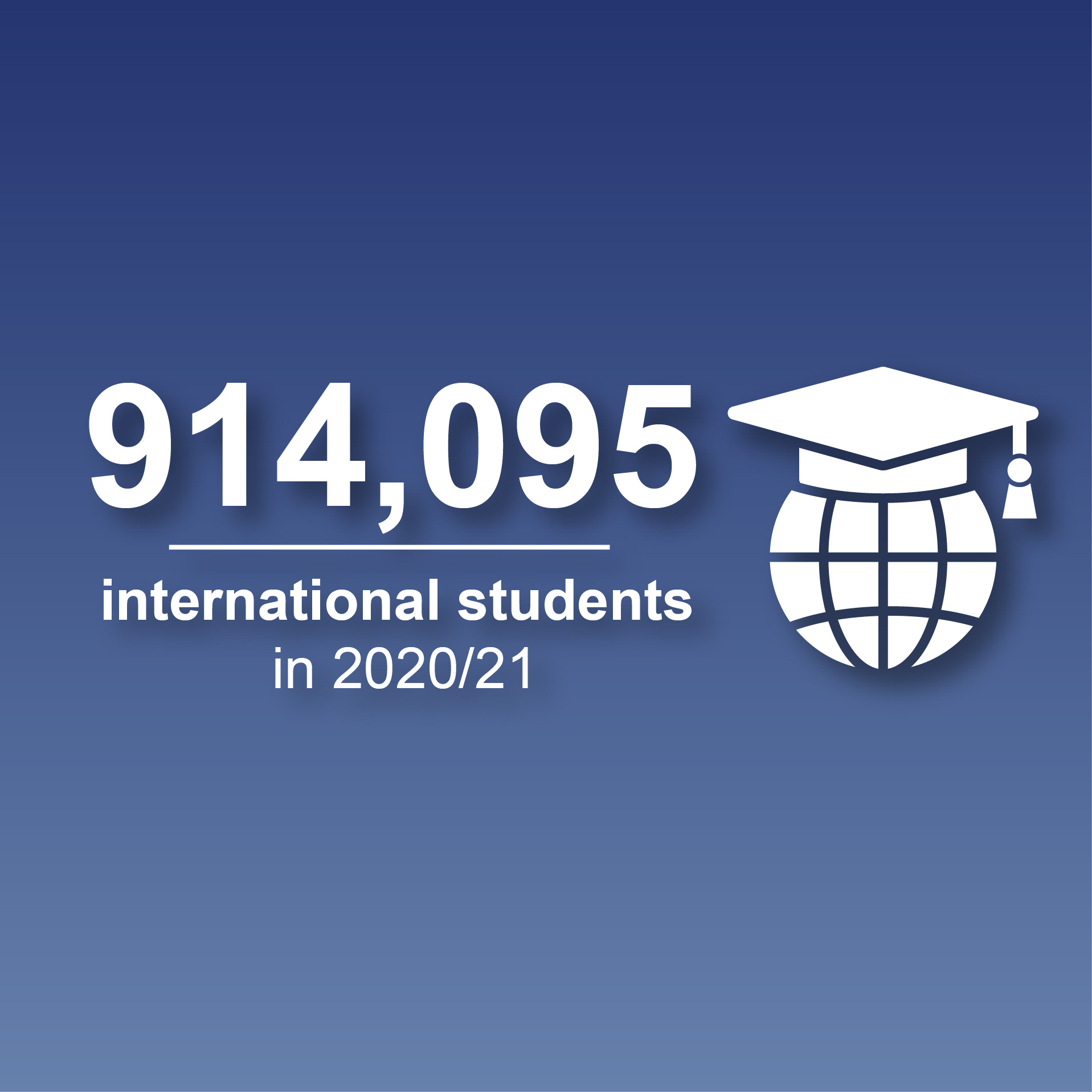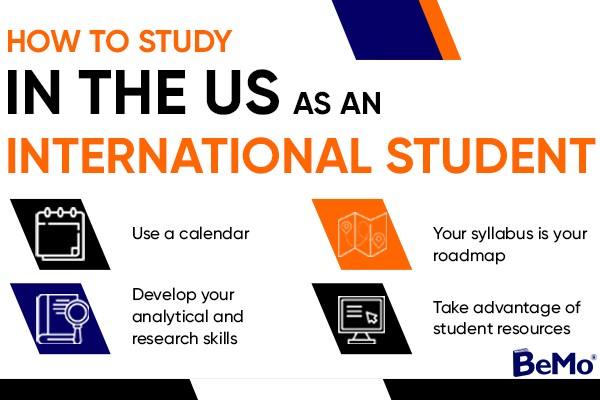According to the Open Doors Report, approximately 914,095 foreign-born students were enrolled at U.S. colleges and universities during the 2020-2021 school year, representing 4.6% of the total U.S. student population. Over 95% of these international students take classes and exams in a language that is not their native tongue and compete with local American students. Going to college in a foreign land can be intimidating, but we prepared some tips and information to help you achieve academic success in US colleges.
Contents
- Absolute vs. Relative Grading (Curve)
- Useful Academic Tools
- Keeping Track of Deadlines and Exam Dates
- Choosing Your Classes
- Assignments: Reading, Papers, Projects, and Lab Reports
- Cheating is Not Tolerated
- Joining a Community
- Internships
- Independent Study for Standardized Tests
- Enjoy Your College Life
Absolute vs. Relative Grading (Curve)
Most courses in university are graded by either of the following two methods: absolute or relative grading. The latter is also known as “bell curve grading” or others may say that such class is “graded on a curve.”
Absolute grading is where the total score you get on exams, papers, and projects is the grade you get in the class regardless of how well or badly any other student performed.
Relative grading, or grading on a curve, is when the performance of the other students in the class affects your grade. Set percentages of students receive certain letter grades. For example, 20% of students will get As while 40% will receive Bs. In this case, the top 20% of students will receive an A whether they scored above 90% on their exams or not. In relative grading, absolute scores are only used to compare how well you performed relative to others.
In some classes, only 10% of students will get As, while in others, a larger percentage may get As. You should refer to the course syllabus to see if the class goes by absolute grading or is graded on a curve, and if the case of the latter, check the percentage distribution for each grade.
Your total GPA is based on the letter grades you receive in all your classes. When job seeking after college or when applying to internships, companies may ask you to put your total or major GPA on your resume.
Useful Academic Tools
Taking courses in a language that is not your native tongue is one of the biggest challenges for international students. At times, you may not be able to fully understand the professor or lecturer’s explanation in class. Reading your textbook is the most classic method of supplementing your college education, but there are times when you may not have time to flip through a thick textbook to teach yourself different concepts.
You can ask questions during the office hours of your professor or during the discussion sections of your TA (teaching assistant). You can find the time and location of your professor’s office hours on the course syllabus and that of your discussion section on your class schedule. Another great tool in this modern day and age is YouTube where you can search what you are having trouble with to learn through tutorials.
One of the largest problems international students face is writing essays in English, a language that is not their first language. For any writing assignment, you can visit your school’s writing center to get your paper checked before turning it in. College writing centers are usually free of charge, so be sure to make use of these resources. Make sure you complete your paper ahead of time because it usually takes more than one session to proofread and polish up your paper.
If you do not have time to go to the writing center or you just want an extra layer of proofreading for your paper, you can use grammar checkers such as Engram and Grammarly to check your writing. If you are a non-native English speaker, Engram will be more helpful among the two because it improves your grammar, spelling, punctuation, and word choice so that your sentences sound more natural.
or classes that involve math, if you have trouble remembering high school level math, you can use the site Wolfram Alpha which helps you understand math problems with step-by-step solutions.
For courses that involve coding, you can find online code correctors that will help you polish up your code. Search a corrector depending on the coding language you are using. For example, you can search “Python code checker” to get your Python code corrected. You can also search or ask about what you are having trouble with on Stack Overflow, a popular site for questions related to coding.
If all else fails and you still do not know where to go for help, you can ask a fellow peer in the class you are struggling with or you can consult an international student advisor who can help guide you to useful academic tools.
Keeping Track of Deadlines and Exam Dates
In US colleges, you are expected to be on top of your own schedule and plan ahead for important deadlines and exam dates. The professor and TAs typically do not remind you when a midterm or final exam will be, and you will be the judge of when you should start studying or writing a paper. You should check your syllabus regularly to make sure you know the regulations of the class and when all the important dates are. Check what textbooks you need and if you have to bring any to class. You have to also prepare the proper equipment for certain courses like laboratory classes (or “lab” for short) and know what is expected of you in any class projects. If you are unsure of anything, take initiative and ask the professor because it is your responsibility to understand the requirements even if the instructor does not tell you first.
Typically, attendance is not taken in US colleges, but there are some exceptions. Some professors or TAs will have you sign an attendance sheet right before class or have you sign in digitally for some lectures and discussion sections. Be sure to check if attendance or being late affects your overall grade in the class. Note that if you skip a class with a small number of students, the professor may notice and mentally dock off some brownie points.
For tests, you will typically have one or more midterms and one final exam. Be sure to know what to bring on an exam day for each class; some classes require you to bring your own scantron or the university’s official testing booklet. Check what writing utensil is preferred as well; some professors prefer answers to be in pen over pencil or vice versa. There is also a wide variety of exams: multiple-choice, short answer, long answer, in-class, take-home, open-book exams, etc. For some classes, you may have a final project or paper instead of a final exam. Make sure you know the format of the test you will be taking to properly prepare and study for it.
To make sure you are not missing any deadlines, you can utilize tools like Google Calendar which you can sync between your phone and desktop to keep track of dates and set reminders. Some students prefer physical planners which are found at bookstores, Walmart, Target, and Amazon.
Choosing Your Classes
Be sure to know when you can sign up for classes for the next semester or quarter. For many colleges in the US, there is an enrollment period which is a small window of time when you can sign up for the courses. You may face trouble signing up for classes if you miss your enrollment time.
For semester systems, students typically take three to five classes per semester, while for the quarter system, students usually take three to four classes a quarter. However, this also depends on the workload of each class, whether the student is doing an internship during that period, or if the student is heavily involved in sports that term. Students also have the option of taking summer session courses to either catch up or get ahead of the game when it comes to completing their classes.
Before you choose your courses, it is a good idea to plan out all the classes you are planning to take for your whole time in college to make sure you will be able to complete all your major and GE (general education) courses in time. If you are planning to double major or pick up a minor or two, make sure to consult a counselor to see if you are allowed to double major in certain majors. For instance, some schools do not let their engineering majors double major because having another major along with engineering is deemed too difficult to handle.
Before enrolling in certain classes, if you want to know more about a professor of a particular class, you can look him, her, or them up on Rate My Professor to get some insight from other students. Read the reviews with a grain of salt, however, because different people can have differing opinions on the same professor.
Assignments: Reading, Papers, Projects, and Lab Reports
College professors typically do not assign the type of homework assigned in high school. The main types of assignments in university are reading, papers, and projects (creating art, writing code, etc.).
History and political science classes tend to assign reading of hundreds of pages of textbooks and supplementary material. Although you may be tempted to skip out on reading assignments, you will most likely need to have completed them for discussions during class and the material may be on an exam later.
For papers, different classes require different formatting and tones of writing, so be sure to abide by all the predetermined requirements. If you are taking certain science classes, you may be required to do lab reports. Like papers, be sure to know the proper formatting before jumping into writing the report.
There are countless different types of projects, from art projects to PowerPoint presentations. The sole most essential thing to remember is to know what is expected of you and not to be shy to ask your professor or TA questions.
Procrastinating is a common habit among college students that can be detrimental especially when it comes to reading assignments, writing papers, and studying for tests. Remember that you will be doing your future self a favor by allocating your time strategically and starting early.
Cheating is Not Tolerated
Cheating is not tolerated in universities in the US. The consequences can be more severe than in other countries. In some cases, schools will expel students for cheating even if it is just a one-time incident. International students may be shocked when they get reprimanded for cheating which they would have gotten away with in their home countries.
Cheating on a test is typically seen as one of the most severe felonies. Copying the answers to a class assignment from a peer and plagiarizing are also forms of cheating that are punishable. Students may be suspended or expelled depending on the school’s regulations.
Although not as common, stealing test material is also a crime. There have been incidents in American universities where students and even non-students come to class on exam days and then slip out of the lecture halls with test booklets in their hands to leak to other students in later classes or academies around the college area. There was even an incident where a professor chased and caught one of these test thieves.
Joining a Community
Getting to know your fellow student body is helpful because you can also ask peers for help when you have trouble academically. Joining clubs or other extracurricular activities are great ways to meet new friends. In international student communities, students give each other tips for getting through college as international students. It is also a good idea to join an American club to get different insight from local students. Starting a part-time job that other fellow students tend to do can also help you broaden your social circle and can accelerate your growth with English, as you learn a different set of English expressions working than as a student. Making friends will make your college life more fun and can help you make connections that may be of aid to your career in the future. If you are further interested in making professional connections, joining a business fraternity can be beneficial in growing your circle to potentially boost your career later on.
Internships
Having internship experience is a great plus later when job seeking. Look for internships that are related to the field you want to go into; biology students can look for lab assistant jobs while prospective law students can look for internships at law firms.
You can visit your university’s career center where there is access to a plethora of opportunities and consult an international student advisor who can help guide you to the right tools for finding internships. Job-seeking sites like LinkedIn and Indeed have listings for internships that you can apply for, and you can also read reviews about companies on Glassdoor to get an idea about their work culture.
Independent Study for Standardized Tests
Some career paths require scores from certain standardized tests; students who want to go to law school typically take the LSAT, and students who wish to pursue a career in the medical field take the MCAT. Not every career path requires standardized test scores, so it is a good idea to look into it beforehand.
College students have to study for these tests on their own time outside of class. There are plenty of prep books for these standardized tests available at bookstores and Amazon. International students who still struggle with English may find taking these standardized tests difficult, so it is important to start studying early and take many practice tests.
Enjoy Your College Life
Although academics is vital to life on campus, don’t forget to enjoy your once-in-a-lifetime college experience. That goes for both international students and local American students.
Reference:
















